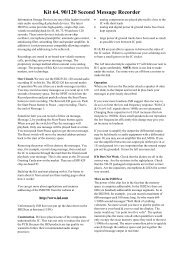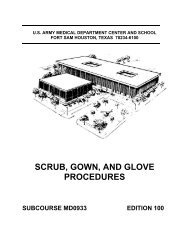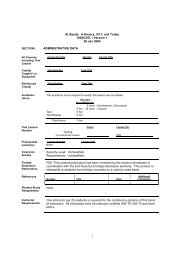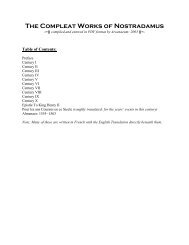Download This File - The Free Information Society
Download This File - The Free Information Society
Download This File - The Free Information Society
You also want an ePaper? Increase the reach of your titles
YUMPU automatically turns print PDFs into web optimized ePapers that Google loves.
DEA<br />
Henry S. Dogin<br />
Acting<br />
Administrator<br />
1975-1976<br />
Henry S. Dogin was appointed Acting Administrator by<br />
Attorney General Edward H. Levi on May 30, 1975, following<br />
the resignation of Administrator Bartels. Prior to his<br />
appointment, Mr. Dogin was Deputy Assistant Attorney<br />
General in the Criminal Division and was responsible for<br />
directing the Department of Justice’s organized crime strike<br />
forces as well as overseeing prosecutions related to narcotics.<br />
Dogin served as Acting Administrator until January 23,<br />
1976, when he assumed the position of Deputy Commissioner<br />
of the Division of Criminal Justice Services for the State of<br />
New York.<br />
DEA Special Agents<br />
1975.....2,135<br />
1980.....1,941<br />
DEA Budget<br />
1975.....$140.9 million<br />
1980.....$206.6 million<br />
25<br />
By 1979, 26 million Americans<br />
were considered regular drug<br />
users.<br />
During this period, drug use in America escalated, and by<br />
1979, 26 million Americans were considered regular drug<br />
users. Government policies urged law enforcement organizations<br />
to de-emphasize marijuana and cocaine investigations<br />
in favor of increased heroin enforcement activities. Because<br />
marijuana and cocaine were not considered high priorities for<br />
law enforcement agencies, many Americans believed they<br />
were free to use both drugs. Consequently, cocaine and<br />
marijuana use became widespread throughout the United<br />
States.<br />
<strong>The</strong> White House White Paper<br />
In early 1975, drug abuse was escalating and the nation faced<br />
new challenges on the drug front. By September 1975,<br />
President Ford set up the Domestic Council Drug Abuse Task<br />
Force, chaired by Vice President Nelson Rockefeller, to assess<br />
the extent of drug abuse in America and to make recommendations<br />
for handling it. <strong>The</strong> resulting report, the White Paper,<br />
maintained that “all drugs are not equally dangerous. Enforcement<br />
efforts should therefore concentrate on drugs<br />
which have a high addiction potential...” <strong>This</strong> report deemed<br />
marijuana a minor problem and declared that cocaine was not<br />
a problem. “Cocaine,” the report stated, “is not physically<br />
addictive...and usually does not result in serious social consequences,<br />
such as crime, hospital emergency room<br />
admissions, or death.” <strong>The</strong> report recommended that “priority<br />
in both supply and demand reduction should be directed<br />
toward those drugs which inherently pose a greater risk—<br />
heroin, amphetamines...and mixed barbiturates.”<br />
Specifically, the panel recommended that the DEA and U.S.<br />
Customs Service de-emphasize investigations of marijuana<br />
and cocaine smuggling and give higher priority to heroin<br />
trafficking. <strong>This</strong> policy shifted enforcement efforts, resources,<br />
and manpower away from cocaine cases towards heroin. <strong>The</strong><br />
report recommended that agents focus on Mexico, a source

















